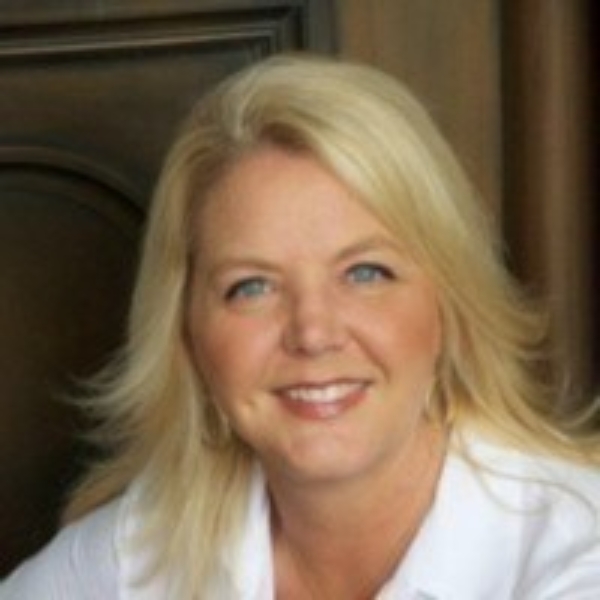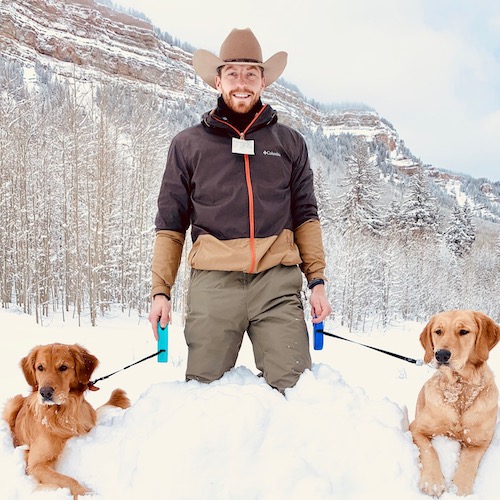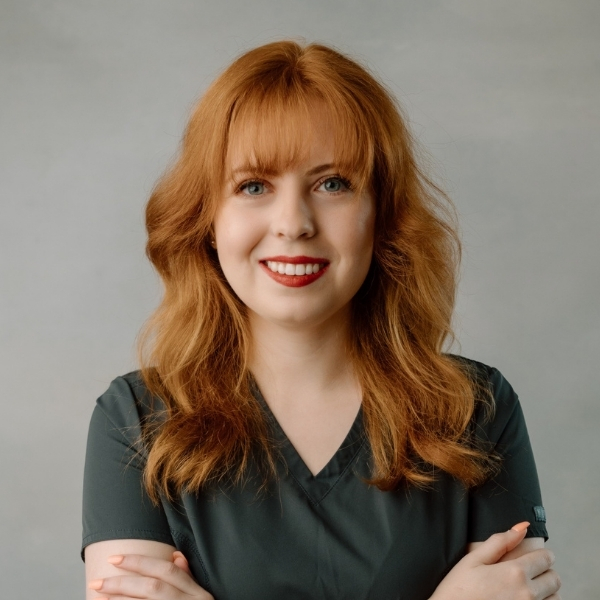How long have you been in hospital management, and what was your journey to it?
I've been doing hospital leadership for close to 12 years now. I started my career in Fire and EMS, then became a registered nurse and was an ER nurse for a while. I kind of fell in love with leadership and mentorship and grew through hospital systems that way. And then, most recently, I left human medicine and found my way over to Vet Med, so here I am at Gulf Coast Veterinary Specialists!
What do you like about vet med so far?
My favorite thing about Vet Med is the patients. I love petting puppies, kittens, sloths, kangaroos — I’m a huge animal lover.
Outside of that, I mean, I think that vet med's really different than human medicine in the absolute lack of regulation and oversight. So, there can be some really big positives there where you can practice medicine the way it was designed to be practiced, and you can do different things; but, there are also some significant downsides there where you can practice medicine however you want to practice medicine, and not everyone has the same standard of care.
I really enjoy the challenge, though, of helping the team elevate the medicine. And some of that human health experience in best practice and excellence. Like, how can we be purposeful? Digging into how and why we do things. But you still get all those benefits of not having companies and systems like Medicare, Medicaid, and insurance telling you how you have to do things. So there are a lot of positives and benefits there.
Tell me a little about Gulf Coast Veterinary Specialists.
Gulf Coast is widely accepted as the second-largest specialty animal hospital in the country.
If you haven't been here, it’s hard to appreciate the true size of the facility. I've run human hospitals that were smaller and had considerably fewer specialties.
We currently have 14 specialties and about 80 DVMs. The vast majority are board-certified, so top-tier doctors. I have some of the leading experts in the country in different aspects of medicine who work here.
I have about 350 to 400 technical staff that see over 65,000 unique patients a year.
We do things that you just wouldn't imagine. We do interventional cardiology. Do radiation oncology. We have an oxygen therapy hyperbaric chamber. We have the full gamut of new, exciting toys in the vet med space and even things that aren't in the vet med space we have. So we're able to do things that your standard animal hospital just doesn't have the capacity to do.
Why did you choose to go with rally? What piqued your interest?
We often talk about vet med running 10-15 years behind human medicine and not just in the medicine, just in everything we do. And so focusing on the culture and engagement of the staff, we're just really behind in the advancements in best practice and technology in that space. So when I got here, kind of wrapping my arms around the staff and figuring out how to build that culture and engagement was really important to me.
And you know, in the human space, we all have this software similar to this that does these things. And you see such positive benefits from it. There are so many studies out there that talk about how important it is to have a technology avenue to engage with the staff. So, I was in the market for something along those lines anyway.
And when we came across rally, which was a recommendation from one of our sister clinics in San Antonio, first off, they raved about it. And then when we saw how specific it is to vet med — I thought it was a slam dunk for us.
Vet med is unique, and we often try to fit things into how we do things in this industry, but it doesn’t always fit right. So, having a platform that understands the day-in and day-out struggles of being in this space was really important.
It just fits, you know, everything from the terminology to the graphics to the engagement — It’s just better for vet med than if we just went with your typical engagement software suite. That’d be like buying our team McDonald’s, it'll make everybody not hungry, but it won't really make any one specific person fully satisfied.
What got you thinking about employee engagement and retention for GCVS?
I’ve been at Gulf Coast for five months, and I took this position knowing they were going through the same growing pains of any business that's growing significantly, which included a need to start focusing on culture & engagement. Additionally, the stress level in vet med, as we know, is super high, and they just didn't have the time or energy to focus on those kinds of things.
So, I came into this position knowing that that was going to be a huge focus for me. It's an area that I really enjoy working on; it's one of my favorite things about being a leader, so it fits me really well. From the day I got here, I knew I needed to do some pretty basic things to get us moving in the right direction.
So, getting an opportunity to measure, collect meaningful data, and give the staff a voice were all really important. So, as I said earlier, getting a platform like this was on my radar anyway. We were just really fortunate to find rally.
What were your first impressions of using rally?
It's super intuitive; anyone can just hop in and get going.
It doesn't require a lot of training — especially from the behind-the-scenes stuff. Some of these other programs I've used are more in the realm of Microsoft Power BI on the backend, and you're just digging and digging and digging to get where you need to be, and the same data is presented in multiple different ways, and sometimes hard to quantify that. The fact that rally's just intuitive and easy to understand was really beneficial to us.
And then, from the staff standpoint, the training to get them up and running, it was just so simple. We really just said, “Hey, here's your login, get in there, here's a quick video,” but to be honest with you, if you know how to use a smartphone or a computer, you’ll be able to get going super easily, and I think you see that in the engagement that we've achieved with it.
How was your onboarding process? How do you feel about hound’s support?
You're one of my top-tier vendors.
When we first came on board, we didn’t realize how the notification system worked, and our staff had questions about it. Within an hour of emailing your team, Huff (Chief Experience Officer) sent a personalized video that walked through how to resolve it. For my staff to see that was just invaluable.
They really appreciated having a vendor that when we brought up an issue, you not only immediately recognized and addressed it, but did so in a really personal fashion. And so I think it's really important for them to know that you care about us as Gulf Coast.
What positive impacts have you seen in your teams from using Rally?
Daily the booping is just a happy point for everybody. From the frontline staff perspective, they are having a great time with that, so that's really neat for them.
What they don't see is all the stuff on the backend.
The magic wands have been instrumental to some of the changes that we've accomplished here at Gulf Coast. Having a platform for them to be able to, either publicly or anonymously, share with us concerns and suggestions is something that was really lacking.
Just like everyone else, we tried the old-fashioned suggestion boxes, and it just isn't interactive enough. It doesn't meet today's standard of what people want.
We’ve had 25 magic wands in the first 2 months — and every single one of them has translated into a meaningful impact for our team.
What are some magic moments you've had on rally?
Our first magic wand was a huge moment for us. The actual topic would be completely meaningless to somebody who's not at Gulf Coast, but it was something that had been bothering the staff for over a year and was a tiny little speck on management’s radar that hadn’t been prioritized.
But it came in as a magic wand, and we were able to instantly address it — that was just huge.
It was a great way for us to show our team that this software is valuable and it's working. Honestly, we wouldn't have known about this had they not pointed it out, and we were able to immediately respond and get the reaction that we wanted from everybody.
That was the turning point for us — this is going to work really well, both for them and for us, definitely.
How would your teams feel if Rally was taken away from them?
I mean, if you take something like this away from they're going to be upset, right?
If you peel something like this away from them that they're enjoying — that'd be like taking away dessert! There's just zero reason that we would take something that is engaging them away.
How do you think other practices large or small could benefit from Rally?
Truthfully, I don't know why you wouldn't want it — even the tiniest hospitals.
We have a sister facility up the street from us that has 25 employees, and their leadership will say, “Well, we're so small that we can just talk in real-time and have those conversations,” but that’s missing the point.
Even when we were implementing, I had a surgeon push back on it saying, “Well, I don't need this because I tell my people in the OR that they're doing great things.” And I said, “I hear what you're saying, and that's important, but everybody doesn't see or hear that. When you boop them, the entire hospital knows that top-tier surgeon said something really nice about that tech assistant — that's impactful not only to that person, but to the entire team.”
So using a platform to really kind of put that out there — it's why we love social media. Right? This is like social media for engagement, and it's just really important. We all love that public recognition.
What piece of advice would you have for other specialty hospitals using rally?
Gosh, my only advice would be to just do it. It's just so simple, basic, and easy.
The implementation process is nothing.
The cost is very reasonable for the return.
I think if anything, I guess my big advice would be, and this is true for any software, is you have to stay on it. The first week or month, there will always be a big spike in engagement, and then it levels out over time. So, finding meaningful, creative ways to keep people engaged in it until it becomes ingrained behavior.








